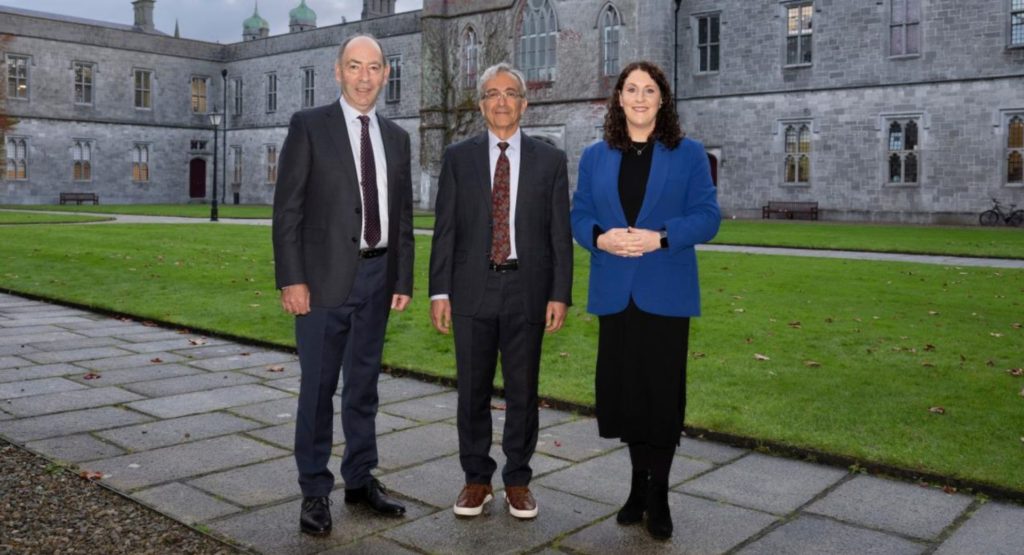Science
University of Galway Partners with Trane Technologies for Research

The University of Galway has established a new research partnership with global engineering leader Trane Technologies, aiming to advance sustainable technology within the heating, ventilation, air conditioning, and refrigeration (HVACR) industry. This collaboration, set to span three years, is expected to leverage the expertise of both organizations to address pressing environmental challenges.
Trane Technologies, with over 40 years in the HVACR sector, operates more than 40 sites globally, including its well-known manufacturing subsidiary, Thermo King. This partnership aligns with the university’s commitment to innovation and sustainability, reflecting a growing trend in research that prioritizes environmental impact.
Focusing on Sustainable Solutions
The collaboration will focus specifically on developing technologies that enhance energy efficiency and reduce greenhouse gas emissions in HVACR systems. The university plans to utilize its research capabilities and academic resources to support this initiative, which aims to create solutions that are both effective and environmentally friendly.
According to Dr. Orla O’Donovan, Vice President for Research at the University of Galway, “This partnership is a significant step towards addressing the urgent need for sustainable solutions in the HVACR industry. By combining our research strengths with Trane Technologies’ industry expertise, we aim to drive innovation that makes a tangible difference.”
The research partnership is not only set to foster advancements in technology but also to provide opportunities for students and researchers at the University of Galway. This initiative will enable them to engage in real-world projects, enhancing their skills and knowledge in sustainable engineering.
Global Impact of the Collaboration
The collaboration with Trane Technologies is expected to have a far-reaching impact, not only within Ireland but also globally. As concerns about climate change intensify, the demand for sustainable practices across industries has become more critical. The HVACR sector, which significantly contributes to energy consumption, is under increasing pressure to adopt greener technologies.
Trane Technologies has made significant strides in this area, with its commitment to sustainability reflected in its operational practices and product development. The company’s initiatives focus on reducing energy consumption and carbon emissions, aiming for a more sustainable future in the HVACR industry.
The University of Galway’s partnership with such a prominent player in the field underscores its role as a key institution in fostering innovation and addressing global environmental challenges. Together, these organizations are poised to contribute valuable insights and advancements that could reshape the future of HVACR technology.
This collaboration is expected to commence immediately, with initial research activities planned for 2023. As both parties move forward, they anticipate the development of cutting-edge solutions that will not only benefit the industry but also contribute to broader environmental goals.
-

 Top Stories2 months ago
Top Stories2 months agoTributes Surge for 9-Year-Old Leon Briody After Cancer Battle
-

 Entertainment3 months ago
Entertainment3 months agoAimee Osbourne Joins Family for Emotional Tribute to Ozzy
-

 Politics3 months ago
Politics3 months agoDanny Healy-Rae Considers Complaint After Altercation with Garda
-

 Top Stories3 months ago
Top Stories3 months agoIreland Enjoys Summer Heat as Hurricane Erin Approaches Atlantic
-

 World4 months ago
World4 months agoHawaii Commemorates 80 Years Since Hiroshima Bombing with Ceremony
-

 Top Stories4 months ago
Top Stories4 months agoFianna Fáil TDs Urgently Consider Maire Geoghegan-Quinn for Presidency
-

 Top Stories2 months ago
Top Stories2 months agoNewcastle West Woman Patricia Foley Found Safe After Urgent Search
-

 World4 months ago
World4 months agoGaza Aid Distribution Tragedy: 20 Killed Amid Ongoing Violence
-

 World4 months ago
World4 months agoCouple Convicted of Murdering Two-Year-Old Grandson in Wales
-

 Top Stories3 months ago
Top Stories3 months agoHike Donegal’s Errigal Mountain NOW for Unforgettable Summer Views
-

 World4 months ago
World4 months agoAristocrat Constance Marten and Partner Convicted of Infant Murder
-

 Top Stories3 months ago
Top Stories3 months agoClimbing Errigal: A Must-Do Summer Adventure in Donegal









